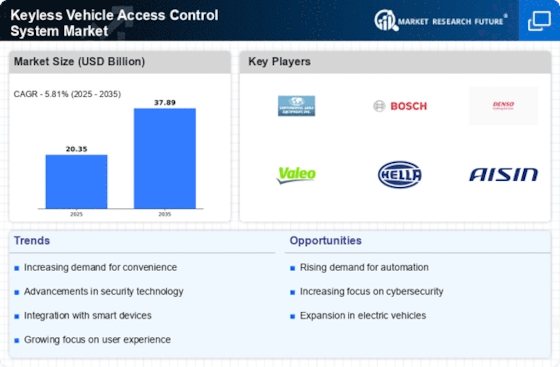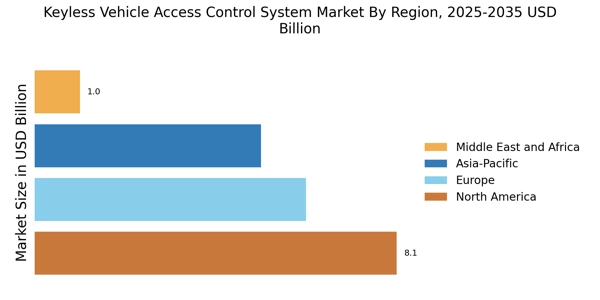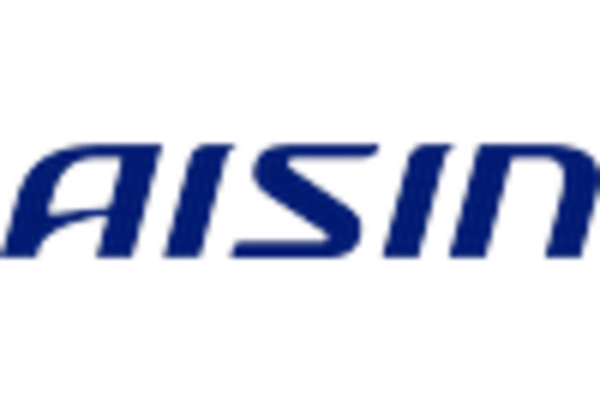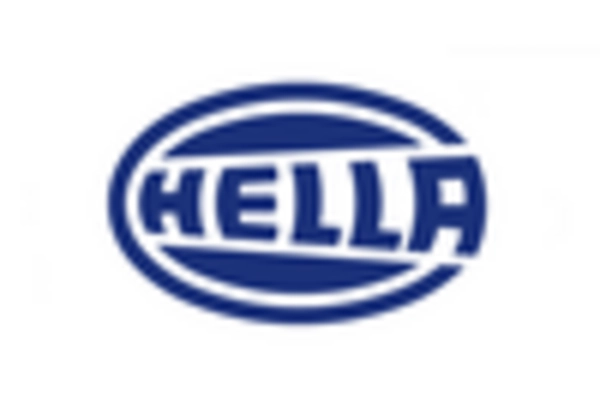Rising Demand for Convenience
The Keyless Vehicle Access Control System Market experiences a notable surge in demand for convenience among consumers. As lifestyles become increasingly fast-paced, the need for seamless vehicle access solutions grows. Keyless entry systems provide users with the ability to unlock and start their vehicles without traditional keys, enhancing user experience. According to recent data, the market for keyless entry systems is projected to expand significantly, with a compound annual growth rate (CAGR) of approximately 10% over the next five years. This trend indicates a shift in consumer preferences towards more user-friendly technologies, thereby driving the Keyless Vehicle Access Control System Market forward.
Consumer Awareness and Education
Consumer awareness regarding the benefits of keyless entry systems is steadily increasing, which is positively impacting the Keyless Vehicle Access Control System Market. As more individuals become informed about the advantages of these systems, including convenience and enhanced security, the demand for such technologies is likely to rise. Educational campaigns by manufacturers and industry stakeholders are playing a crucial role in this regard. Surveys indicate that nearly 70% of consumers are now aware of keyless entry options, a significant increase from previous years. This growing awareness is expected to drive further adoption and innovation within the Keyless Vehicle Access Control System Market.
Growing Electric Vehicle Adoption
The rise in electric vehicle (EV) adoption is a pivotal driver for the Keyless Vehicle Access Control System Market. As consumers shift towards more sustainable transportation options, the demand for innovative access solutions that complement electric vehicles is increasing. Keyless entry systems are particularly appealing to EV manufacturers, as they align with the modern, tech-savvy image of electric vehicles. Recent reports indicate that the EV market is expected to grow at a CAGR of 22% through 2030, which will likely bolster the Keyless Vehicle Access Control System Market as manufacturers seek to enhance the appeal of their electric offerings.
Enhanced Vehicle Security Features
Security concerns remain paramount in the automotive sector, propelling advancements in the Keyless Vehicle Access Control System Market. As vehicle theft rates continue to rise, manufacturers are increasingly integrating sophisticated security features into keyless systems. These features often include encrypted signals and biometric authentication, which significantly reduce the risk of unauthorized access. Recent statistics suggest that vehicles equipped with advanced keyless entry systems experience a 30% lower theft rate compared to those with traditional keys. This heightened focus on security not only reassures consumers but also stimulates growth within the Keyless Vehicle Access Control System Market.
Integration with Autonomous Driving Technologies
The evolution of autonomous driving technologies is poised to influence the Keyless Vehicle Access Control System Market profoundly. As vehicles become more automated, the need for advanced access control systems that can seamlessly integrate with these technologies becomes apparent. Keyless entry systems are increasingly being designed to work in conjunction with autonomous features, allowing for a more cohesive user experience. This integration is expected to attract significant investment, with projections indicating that the market for autonomous vehicles will reach USD 60 billion by 2030. Consequently, the Keyless Vehicle Access Control System Market stands to benefit from this technological convergence.

















